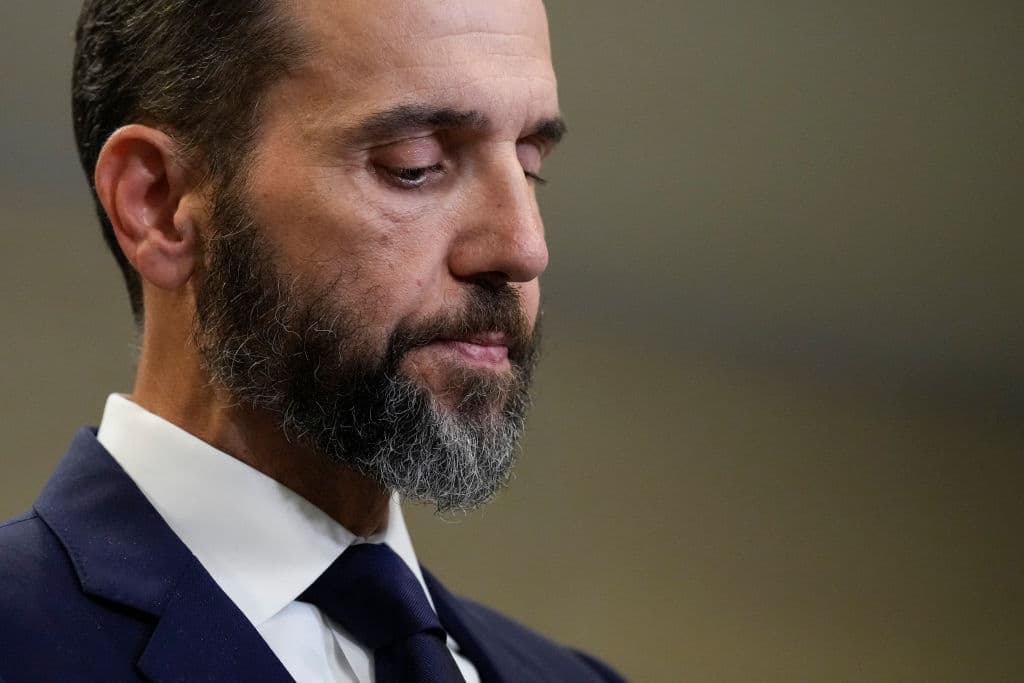In a Stunning Victory for Trump, Judge Cannon Dismisses Mar-a-Lago Case, Rules Jack Smith Unconstitutionally Appointed
Pending appeal, Trump has secured a consequential victory with respect to more than two dozen criminal charges.

Judge Aileen Cannon’s dismissal of the Mar-a-Lago case against President Trump on the grounds that Special Counsel Jack Smith is unconstitutionally appointed is a stunning victory for the 45th president just days before he accepts his party’s nomination to be the 47th one. Pending appeal, Trump has secured a consequential triumph with respect to more than two dozen criminal charges.
Judge Cannon, who was named to the bench by Trump, failed to find any authority that gives Attorney General Garland “broad inferior-officer appointing power or bestows upon him the right to appoint a federal officer with the kind of prosecutorial power wielded” by Mr. Smith. She finds the prosecutor’s elevation crosswise with the Constitution’s Appointments Clause and rejects his “strained statutory arguments: and appeals to inconsistent history.”
The jurist writes that the “bottom line” is that “The Appointments Clause is a critical constitutional restriction stemming from the separation of powers, and it gives to Congress a considered role in determining the propriety of vesting appointment power for inferior officers.” She reckons that the manner in which Mr. Smith assumed his position — he was neither nominated by the president nor confirmed by the Senate — “usurps” this constitutional order.
The Sun spoke to one of the legal scholars, Joshua Blackman, who argued before Judge Cannon that Mr. Smith’s appointment was unlawful. He expects Mr. Smith to “take a speedy review to the Eleventh Circuit Court of Appeals, or he may even jump straight to the Supreme Court.” Mr. Blackman reasons that the prosecutor’s “primary objective is to convict Trump before the election, or at least before the inauguration, so time is of the essence for him.”
Mr. Blackman represented in court another law professor, Seth Barrett Tillman. Mr. Barrett Tillman tells the Sun that the ruling is “a timely and thoughtful decision by a courageous judge, who having considered the arguments before her reached her own independent decision.” He called her a “model for judges across our land.” Judge Cannon’s ruling upends 30 years of precedent over the appointment of special counsels.
The dismissal comes two weeks after Judge Clarence Thomas, in a concurrence in the presidential immunity case, suggested that he would be open to considering arguments as to whether Mr. Smith’s appointment was valid. He wrote separately “to highlight another way in which this prosecution may violate our constitutional structure” — how Mr. Smith came into the job. Now he could soon hear the special counsel’s appeal to keep his position.
In finding Mr. Smith’s appointment unconstitutional, Judge Cannon determined that the Supreme Court, in United States v. Nixon, did not rule otherwise because its considerations on the question were dictum, meaning non-binding. The constitutionality of what was then known as independent counsel, she reasons “was not raised, argued, disputed, or analyzed” in that case, which involved Special Prosecutor Leon Jaworski’s investigation and prosecution of those involved in Watergate.
The court in Nixon wrote that Congress vested in the attorney general “the power to appoint subordinate officers to assist him in the discharge of his duties.” That would appear to support Mr. Smith’s position. Judge Cannon, though, finds that the high court’s “passing remarks on that point are not binding precedent” but amount to mere “stray remarks” that do not compel future cases.
Judge Cannon’s finding that the Supreme Court’s apparent authorization of appointment of subordinate officers by the attorney general was merely churn in “a prefatory, stage-setting paragraph” could soon make its way to the Supreme Court on appeal. The Nine would then be required to weigh its own precedent as it determines whether to overrule Judge Cannon.
The Florida jurist could have opted to scotch Mr. Smith’s appointment while keeping the case he brought intact. She writes, though, that because his “exercise of prosecutorial power has not been authorized by law, the Court sees no way forward aside from dismissal of the Superseding Indictment.” That is because “all actions that flowed from” Mr. Smith’s “defective appointment … were unlawful exercises of executive power.”
In agreeing with Trump’s assertion that any actions taken by Mr. Smith are ultra vires, or undertaken without lawful authority, Judge Cannon rules that the work the special counsel has performed is unsalvageable. She writes that “there can be no valid officer without a valid office.” Now, it will be up to the riders of the 11th Circuit to uphold her ruling, or find that she overstepped.
Judge Cannon also found that Mr. Smith’s appointment violated the Appropriations Clause, which ordains that “No Money shall be drawn from the Treasury, but in Consequence of Appropriations made by Law.” She finds that the “special counsel’s investigation has unlawfully drawn funds” from the grant of funds to the Department of Justice because he is neither an “independent counsel” nor lawfully appointed.
The judge puts into high relief the tension between Mr. Smith’s assertion that he is an independent counsel with respect to appropriations but an inferior officer with respect to his appointment. As she puts it, he “contends he is independent enough to access the funds, but not so independent to constitute a principal officer.” She observed that Mr. Smith’s office has spent “tens of millions of dollars since November 2022.”
Judge Cannon concludes that the “prosecution of this action breaches two structural cornerstones of our constitutional scheme—the role of Congress in the appointment of constitutional officers, and the role of Congress in authorizing expenditures by law.” For now, the Espionage Act and obstruction charges against Trump are consigned to history’s dustbin.
________
This article has been updated from the bulldog.

